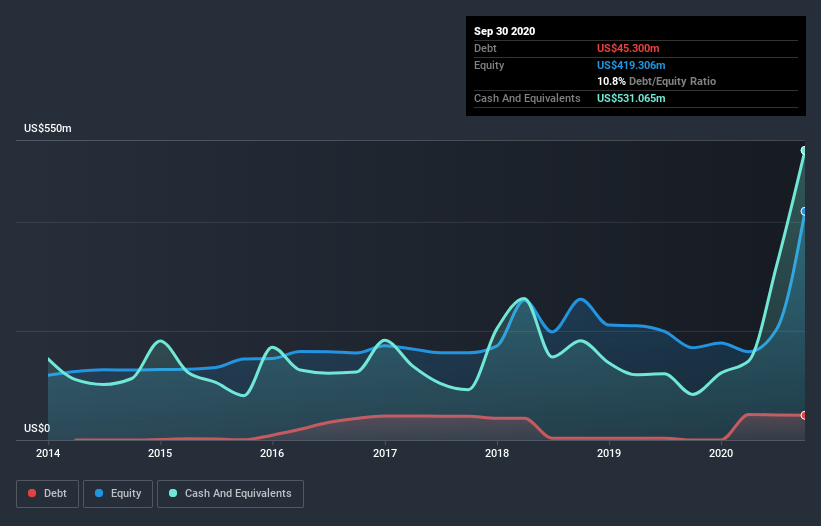- United States
- /
- Specialty Stores
- /
- NYSE:BBBY
Does Overstock.com (NASDAQ:OSTK) Have A Healthy Balance Sheet?
Warren Buffett famously said, 'Volatility is far from synonymous with risk.' So it might be obvious that you need to consider debt, when you think about how risky any given stock is, because too much debt can sink a company. As with many other companies Overstock.com, Inc. (NASDAQ:OSTK) makes use of debt. But the real question is whether this debt is making the company risky.
What Risk Does Debt Bring?
Debt is a tool to help businesses grow, but if a business is incapable of paying off its lenders, then it exists at their mercy. Part and parcel of capitalism is the process of 'creative destruction' where failed businesses are mercilessly liquidated by their bankers. While that is not too common, we often do see indebted companies permanently diluting shareholders because lenders force them to raise capital at a distressed price. By replacing dilution, though, debt can be an extremely good tool for businesses that need capital to invest in growth at high rates of return. When we think about a company's use of debt, we first look at cash and debt together.
Check out our latest analysis for Overstock.com
How Much Debt Does Overstock.com Carry?
As you can see below, at the end of September 2020, Overstock.com had US$45.3m of debt, up from none a year ago. Click the image for more detail. But on the other hand it also has US$531.1m in cash, leading to a US$485.8m net cash position.

A Look At Overstock.com's Liabilities
According to the last reported balance sheet, Overstock.com had liabilities of US$353.9m due within 12 months, and liabilities of US$69.8m due beyond 12 months. On the other hand, it had cash of US$531.1m and US$35.4m worth of receivables due within a year. So it can boast US$142.8m more liquid assets than total liabilities.
This surplus suggests that Overstock.com has a conservative balance sheet, and could probably eliminate its debt without much difficulty. Simply put, the fact that Overstock.com has more cash than debt is arguably a good indication that it can manage its debt safely.
Although Overstock.com made a loss at the EBIT level, last year, it was also good to see that it generated US$2.3m in EBIT over the last twelve months. When analysing debt levels, the balance sheet is the obvious place to start. But it is future earnings, more than anything, that will determine Overstock.com's ability to maintain a healthy balance sheet going forward. So if you want to see what the professionals think, you might find this free report on analyst profit forecasts to be interesting.
Finally, a business needs free cash flow to pay off debt; accounting profits just don't cut it. While Overstock.com has net cash on its balance sheet, it's still worth taking a look at its ability to convert earnings before interest and tax (EBIT) to free cash flow, to help us understand how quickly it is building (or eroding) that cash balance. Happily for any shareholders, Overstock.com actually produced more free cash flow than EBIT over the last year. That sort of strong cash conversion gets us as excited as the crowd when the beat drops at a Daft Punk concert.
Summing up
While we empathize with investors who find debt concerning, you should keep in mind that Overstock.com has net cash of US$485.8m, as well as more liquid assets than liabilities. And it impressed us with free cash flow of US$187m, being 8,199% of its EBIT. So we don't think Overstock.com's use of debt is risky. There's no doubt that we learn most about debt from the balance sheet. But ultimately, every company can contain risks that exist outside of the balance sheet. Case in point: We've spotted 4 warning signs for Overstock.com you should be aware of.
At the end of the day, it's often better to focus on companies that are free from net debt. You can access our special list of such companies (all with a track record of profit growth). It's free.
If you’re looking to trade Overstock.com, open an account with the lowest-cost* platform trusted by professionals, Interactive Brokers. Their clients from over 200 countries and territories trade stocks, options, futures, forex, bonds and funds worldwide from a single integrated account. Promoted
Valuation is complex, but we're here to simplify it.
Discover if Bed Bath & Beyond might be undervalued or overvalued with our detailed analysis, featuring fair value estimates, potential risks, dividends, insider trades, and its financial condition.
Access Free AnalysisThis article by Simply Wall St is general in nature. It does not constitute a recommendation to buy or sell any stock, and does not take account of your objectives, or your financial situation. We aim to bring you long-term focused analysis driven by fundamental data. Note that our analysis may not factor in the latest price-sensitive company announcements or qualitative material. Simply Wall St has no position in any stocks mentioned.
*Interactive Brokers Rated Lowest Cost Broker by StockBrokers.com Annual Online Review 2020
Have feedback on this article? Concerned about the content? Get in touch with us directly. Alternatively, email editorial-team (at) simplywallst.com.
About NYSE:BBBY
Bed Bath & Beyond
Operates as an e-commerce affinity marketing company in the United States and Canada.
Adequate balance sheet and fair value.
Similar Companies
Market Insights
Community Narratives



